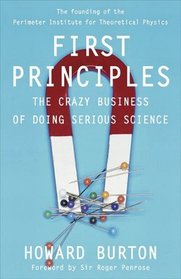This book has got my attention a couple of weeks ago during one of my weekend bookstore roaming. On the book cover one could read that this was about the foundation of a theoretical physics institute in Waterloo, the Perimiter Institute. An institute that aims answering foundational questions about quantum physics while taking different sometimes divergent approaches in tackling this problem.
I I was buffeled to read this. I have already read books about the Institute of Advanced Studies in Princeton and the Santa Fe Institute, though I was unaware that a research institute of the same calibre existed in Canada.
In the first chapters Howard Burton tells the reader how he decided to start a career in theoretical physics taking us from a high school in Toronto to the UK, to the Netherlands and back to Waterloo where he earned a Ph.D. in the field.
After a short career in Wall Street, the author applied for a position (certainly not a physicist) to many companies including the Waterloo-based Research In motion (RIM). Unexpectedly, Burton was contacted by Mike Lazaridis who offered a donation of 100 million dollars to start a theoretical physics institute in Waterloo.
The author's journey then begins. Encounters with many prominent physicists across the world were done first, in order to get some advice on how to start a research institute. Then, followed the task of choosing board members and the hunt of research grants from governmental agencies. A chapter was also dedicated to the construction of the building itself.
The book was written with humor and some false modesty, a style that I do not dislike. The funniest part is when Burton met Roger Penrose at his house for the first time. Burton was so impressed and intimidated until the moment when Penrose and other physicists started looking desperately for an antique phone buried somewhere in Penrose's study in order to make a phone call. Burton commented
I started to relax and enjoy the moment. I'm no Roger Penrose, but in my house, at least, the phone is regularly plugged in, and calling overseas is generally not regarded as logistically equal to launching the space shuttle.
The book thouches on much more serious topics as well like the neccessity to motivate high-school science teachers to give a more lively introduction to science instead of dull lectures, the need for researchers in academe to be more paragmatic and address problems that have impact on society instead of pusuing in-fashion topics and/or topics that are more likely to lead to publications (i.e. adding an extra line to a CV). The author also seems to be a strong defender of multidisciplinary research.
Howard Burton left PI in 2007, according to him this was due to this book that ignited a clash of egos between him and Mike Lazaridis.

